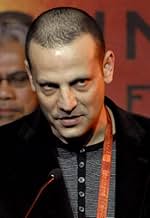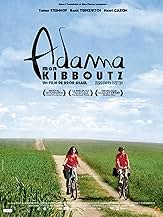Ajouter une intrigue dans votre langueSet in mid-70's, 12-year old Dvir Avni navigates between the equality values of his home-born Kibbutz and the relationship with his undermined mother, whom the Kibbutz members will to denoun... Tout lireSet in mid-70's, 12-year old Dvir Avni navigates between the equality values of his home-born Kibbutz and the relationship with his undermined mother, whom the Kibbutz members will to denounce.Set in mid-70's, 12-year old Dvir Avni navigates between the equality values of his home-born Kibbutz and the relationship with his undermined mother, whom the Kibbutz members will to denounce.
- Réalisation
- Scénario
- Casting principal
- Récompenses
- 9 victoires et 7 nominations au total
Avis à la une
I saw this movie, just now, not when it was released and hailed as best picture of the year here in Israel. and to summarize everything right now, I will just say: this is not a good film.
This is Dror Shaul's second feature film, and I have to admit that his first and the TV drama he made before this picture are much better. further more, this is his first attempt at directing a drama. the early works were comedies, and were funny and effective.
The first thing you have to know if you'll ever see this film: Israel of the 21st century hates the kibbutz and the values it represented since the formation of the state of Israel. the real situation of the kibbutzim is very dire, and some of them disappear one by one. the kibbutz, Hebrew word for collective, was a sort of village for members only, where the values of equality and socialism were the dogma for everyday life. with the change in social values with time, it seems now that the kibbutz was a place where the human spirit was repressed, locked within the dogma rules, with no ticket out. the entrance of capitalist values and way of life in the 90's and so far made it very hard on the kibbutzim to survive. the crazy mother in the film is the central metaphor for that.
But, I regard this film as having nothing to do with nostalgia for the good old days of the kibbutz. once, it was a dream of every young couple to live in a kibbutz and raise children in this quite and beautiful environment. but the film shows the opposite. that the kibbutz, with it's socialist dogma, was a place sort of like a cult of crazy people, with crazy ideas that undermine the freedom of each individual within the collective. this is the central philosophy of post modern capitalism: your individuality is the most important thing. you must place yourself in the center, and no one else but you is the matter. this is the philosophy the film stands for, and that's just it's first sin.
If you disagree with me on the political side, I'm sure you will agree that the acting, the tone of the film, it's script and it's direction are the four sins that follow. the film has no real visual text and none of it's shots is something to remember. it is also very "delicate", a delicacy that is no more than artsy fartsy attempt to provoke emotions, which do not surface, not in the film and not with the viewer. it brings nothing but boredom.
Can someone please explain: why this film won so many prizes? maybe because it shows that Israel is in line with the rest of the world, hating socialist and human values? or maybe it shows that Israel is a "delicate" place, not giving in to dogmas and fanaticism? that we are basically very human and good people, capable of emotions, especially when they are fake ones, just like capitalism expects us to be? or maybe because it tells one of the biggest lies of Israeli cinema in recent years, a lie that undermines the justification of the existence of the Jewish state? no matter what the answer is, it's not a good one. not for the world, not for human values and not for the Jews.
This is Dror Shaul's second feature film, and I have to admit that his first and the TV drama he made before this picture are much better. further more, this is his first attempt at directing a drama. the early works were comedies, and were funny and effective.
The first thing you have to know if you'll ever see this film: Israel of the 21st century hates the kibbutz and the values it represented since the formation of the state of Israel. the real situation of the kibbutzim is very dire, and some of them disappear one by one. the kibbutz, Hebrew word for collective, was a sort of village for members only, where the values of equality and socialism were the dogma for everyday life. with the change in social values with time, it seems now that the kibbutz was a place where the human spirit was repressed, locked within the dogma rules, with no ticket out. the entrance of capitalist values and way of life in the 90's and so far made it very hard on the kibbutzim to survive. the crazy mother in the film is the central metaphor for that.
But, I regard this film as having nothing to do with nostalgia for the good old days of the kibbutz. once, it was a dream of every young couple to live in a kibbutz and raise children in this quite and beautiful environment. but the film shows the opposite. that the kibbutz, with it's socialist dogma, was a place sort of like a cult of crazy people, with crazy ideas that undermine the freedom of each individual within the collective. this is the central philosophy of post modern capitalism: your individuality is the most important thing. you must place yourself in the center, and no one else but you is the matter. this is the philosophy the film stands for, and that's just it's first sin.
If you disagree with me on the political side, I'm sure you will agree that the acting, the tone of the film, it's script and it's direction are the four sins that follow. the film has no real visual text and none of it's shots is something to remember. it is also very "delicate", a delicacy that is no more than artsy fartsy attempt to provoke emotions, which do not surface, not in the film and not with the viewer. it brings nothing but boredom.
Can someone please explain: why this film won so many prizes? maybe because it shows that Israel is in line with the rest of the world, hating socialist and human values? or maybe it shows that Israel is a "delicate" place, not giving in to dogmas and fanaticism? that we are basically very human and good people, capable of emotions, especially when they are fake ones, just like capitalism expects us to be? or maybe because it tells one of the biggest lies of Israeli cinema in recent years, a lie that undermines the justification of the existence of the Jewish state? no matter what the answer is, it's not a good one. not for the world, not for human values and not for the Jews.
I think that it is unfair to say that this film is a vehicle to question the justification for a Jewish state, as the reviewer above notes. The film is a stark examination of the social and cultural pressures operating within the closed community of the kibbutz collective. No doubt, the response to the main character's illness both from the collective and from the individuals of the community receives harsh treatment here, but I fail to see this as a global condemnation of Israeli society. The main characters unraveling and her family's attempts to deal with this are very well done and the treatment is sincere and thoughtful. It's hard to believe that the story takes place as recently as 1974.Hadn't we come farther than that by then?
Any film which begins with a cowhand shagging a female calf can't promise much. As for the stereotyping of the kibbutz as it was 50 yrs ago, well I was there and it just wasn't like that. OK every kibbutz had just a small piece of something shown in the film (like youngsters raiding the kitchen at night) but you can't show the whole kibbutz as being full of all those - shall we say - naughty traits. Each kibbutz had its own problems, but hardly any kibbutz had all of them. The views of Israel were great. I still remember my youth in that Garden of Eden called the Emek (valley). Yes, and the acting was good too, so you see it wasn't all black - just a wrong portrayal - probably on purpose too.
I saw this film in an audience of about 80 American Jews passionately devoted to Israel. Most had visited Kibbutzim, a number had lived on one or more. Some thought Dror Shaul's theme -- the claustrophobic atmosphere and pressure inflicted on a mentally unstable Kibbutz member -- reflected aspects of kibbutz life they had witnessed. Others saw it as a complete distortion of an Edenic, well-intentioned if ultimately unsuccessful, experiment. One thought it should not be shown to American audiences because it reflected badly on Israel. It is, frankly, an emotionally draining and heart-wrenching story about a youngster (Tomer Steinhof) and his unstable mother (Ronit Yudkevitz), whose instability is seriously aggravated if not caused by the unforgiving atmosphere on the kibbutz. Depending on your perspective, you might hate this film because it doesn't conform to your vision of kibbutz life. You may find it excessively unpleasant and dislike it for that reason. However, though it is undeniably dark, the movie is powerful, well-acted and beautifully directed. It provoked a long discussion among members of the audience whom I saw it with. Many were moved, some were angry. Most thought it was well worth seeing, as do I.
In the center of "Sweet Mud" ("Adama Meshuga'at" in Hebrew) we find the story of Miri Avni (Ronit Yudkevitz) and her growing up son, Dvir (Tomer Steinhof, with a stunning debut), in a southern Kibbutz during the 1970's.
Where people have to struggle to give from themselves for each other, Miri is constantly trying to recover from the mysterious death of her husband. Under these circumstances, Miri's sensitive situation is worsened and stands contrary to the values of equality that rule the Kibbutz, through the eyes of its members.
Dvir, who's at his Bar-Mitzva's year, is familiar with his mom's condition and tries to prevent her from losing her mind and kick her back to float with the stream. This purpose becomes even more complicated when Dvir has to deal the contrast between the Kibbutz's equality values and his mother's liberty and freedom to live as mentally-ill person at the normative society, and is about to change his adolescence and life.
This flick was mastered and crafted by an accurate and sensitive direction, powerful performances, trembling soundtrack and phenomenal cinematography, and it's well driven by its refined storyline.
Dror Shaul portrayed a personal, yet very resolute story of life in the Kibbutz before privatization, alongside a strict, emotionally-precise coming-of-age tale for independence and dignity.
Young actor Tomer Steinhof is the basis of this film. His performance is so minimalistic, so moving and so convincing that he just tears apart the viewers hearts. This kid HAS to win world-wide recognition and must appear on as many films as possible. Beautiful Ronit Yudkevitz is another supporting-pillar of the film, with a wretched, merciless portrait of a lapsed and helpless woman. Her physical and mental deterioration is absolutely heart-rending. The chemistry between these two marvelous actors and the characters they hand over to the screen is very convincing and leads to many emotional refractions.
The supporting actors do wonderful job as well; Senior Belgique actor Henri Garcin shines on a 5-minutes, yet very important role, as the foreign aging lover of Miri; Shai Avivi with a role of the "comic-moderator" though a very malice person; Gal Zaid as the controversial secretary of the Kibbutz; And many more.
Mixed with mesmerizing music and amazing cinematography, this movie turns to be one of the best Israeli films of all times, if not the best of them.
I was truly affected by this piece of culture.
Where people have to struggle to give from themselves for each other, Miri is constantly trying to recover from the mysterious death of her husband. Under these circumstances, Miri's sensitive situation is worsened and stands contrary to the values of equality that rule the Kibbutz, through the eyes of its members.
Dvir, who's at his Bar-Mitzva's year, is familiar with his mom's condition and tries to prevent her from losing her mind and kick her back to float with the stream. This purpose becomes even more complicated when Dvir has to deal the contrast between the Kibbutz's equality values and his mother's liberty and freedom to live as mentally-ill person at the normative society, and is about to change his adolescence and life.
This flick was mastered and crafted by an accurate and sensitive direction, powerful performances, trembling soundtrack and phenomenal cinematography, and it's well driven by its refined storyline.
Dror Shaul portrayed a personal, yet very resolute story of life in the Kibbutz before privatization, alongside a strict, emotionally-precise coming-of-age tale for independence and dignity.
Young actor Tomer Steinhof is the basis of this film. His performance is so minimalistic, so moving and so convincing that he just tears apart the viewers hearts. This kid HAS to win world-wide recognition and must appear on as many films as possible. Beautiful Ronit Yudkevitz is another supporting-pillar of the film, with a wretched, merciless portrait of a lapsed and helpless woman. Her physical and mental deterioration is absolutely heart-rending. The chemistry between these two marvelous actors and the characters they hand over to the screen is very convincing and leads to many emotional refractions.
The supporting actors do wonderful job as well; Senior Belgique actor Henri Garcin shines on a 5-minutes, yet very important role, as the foreign aging lover of Miri; Shai Avivi with a role of the "comic-moderator" though a very malice person; Gal Zaid as the controversial secretary of the Kibbutz; And many more.
Mixed with mesmerizing music and amazing cinematography, this movie turns to be one of the best Israeli films of all times, if not the best of them.
I was truly affected by this piece of culture.
Le saviez-vous
- AnecdotesDanielle Kitsis's debut.
Meilleurs choix
Connectez-vous pour évaluer et suivre la liste de favoris afin de recevoir des recommandations personnalisées
Détails
Box-office
- Budget
- 1 500 000 $US (estimé)
- Montant brut mondial
- 122 307 $US
- Durée
- 1h 30min(90 min)
- Couleur
- Mixage
- Rapport de forme
- 1.85 : 1
Contribuer à cette page
Suggérer une modification ou ajouter du contenu manquant




















